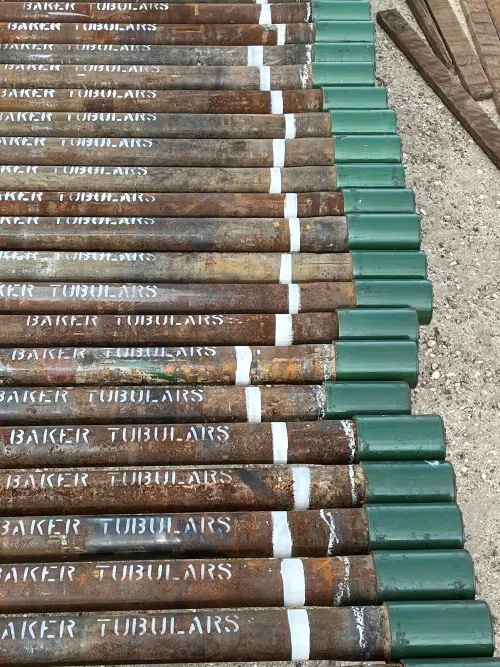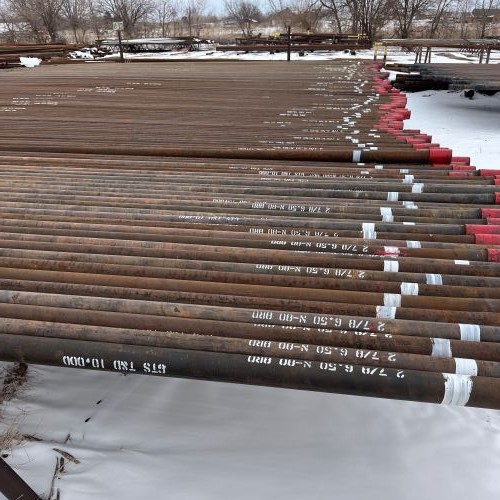Tubulars in Oil and Gas
Searching for tubulars for sale?
Introduction to Tubulars
Tubulars refers to any type of oilfield pipe, such as casing, tubing, drill pipe, line pipe, structural pipe, drill collars, pup joints, and more.
Tubulars are essential components in the oil and gas industry, utilized in the exploration, extraction, and transportation of hydrocarbons. This article provides an in-depth look at the many types of tubulars and how they are utilized within the oil and gas industry.

What Are Tubulars in Oil and Gas?
Tubulars in oil and gas refer to cylindrical components used in the drilling, completion, and production phases of oil and gas wells. It includes a wide range of pipe such as tubing, casing, and drill pipe, each serving a specific function in the well structure and operation. The selection and use of tubulars depend on various factors, including well depth, pressure, temperature, and the chemical properties of the extracted fluids.
Tubing in the Oil Industry
Tubing in the oil industry specifically refers to the pipe through which oil and gas are brought from the reservoir to the surface after drilling is completed. This tubing is a critical component of the well’s production system which is designed to facilitate the flow of hydrocarbons to the surface. Tubing sizes and materials are chosen based on the production requirements and reservoir conditions, ensuring optimal flow rates and minimizing corrosion or wear over time.
Tubulars in Drilling
In drilling operations, tubulars include drill pipe, heavy weight drill pipe (HWDP), and drill collars. Drill pipe forms the majority of the drill string, providing rotational power to the drill bit. Heavy weight drill pipe (HWDP) is used to provide weight and rigidity in high-stress areas. Drill collars is thick-walled pipe used to apply weight on the drill bit. These components are integral to the drilling process, enabling the efficient drilling of wells to target depths.
The Three Types of Tubing
Production Tubing: Installed within the casing to transport fluids from the reservoir to the surface.
Casing Tubing (Casing Pipe): Designed to stabilize the wellbore, casing is installed in the well during the drilling phase.
Drill Pipe: A heavy, seamless tube that rotates the drill bit and circulates drilling fluid.
Each type of tubing plays a distinct role in well construction and operation, with specific designs and materials tailored to their function in the well architecture.

Tubing for Oil
Tubing for oil extraction is selected based on the characteristics of the well and the production environment. It is typically made from carbon steel or corrosion-resistant alloys to handle the harsh conditions found in oil reservoirs. The durability and performance of tubing is paramount to ensuring the continuous and efficient flow of oil and gas.
Materials Used in Oil Tubing
Materials commonly used in the manufacture of oil tubing include carbon steel and corrosion-resistant alloy (CRA). Selection is based on the environment of the well, considering factors such as corrosion potential and mechanical stress. Advanced materials and coatings may be employed to extend the lifespan of tubing in corrosive environments or under extreme temperatures and pressures.
Difference Between Casing and Tubing
Casing and tubing serve distinct purposes in well operations. Casing is installed in the well to maintain borehole stability and is cemented in place. Tubing is smaller in diameter and runs inside the casing to transport oil and gas to the surface. The primary difference lies in their functional role and installation process, with casing providing structural integrity and tubing enabling the extraction of hydrocarbons.
Wellbore Tubulars
Wellbore tubulars refer to the tubes used within the wellbore, including both casing and tubing. These components are crucial for maintaining well integrity, controlling fluid flow, and separating formation fluids. The design and installation of wellbore tubulars are critical to achieving the desired production rates while minimizing environmental impact and ensuring the safety of operations.
Expandable Tubulars in Drilling
Expandable tubulars are a technology that allows for the radial expansion of tubulars within the wellbore. This technology enhances drilling operations by allowing for larger diameter tubulars in the same wellbore size, improving well integrity and reducing drilling costs. Expandable tubulars offer a versatile solution to various well construction and completion challenges, facilitating the development of unconventional resources and improving recovery rates.
Conclusion
Tubulars are essential to the oil and gas industry, facilitating the exploration, extraction, and transportation of hydrocarbons. Baker Tubulars supplies all types and sizes of tubulars, which can be utilized in many applications. Baker Tubulars supplies casing, tubing, drill pipe, line pipe, structural pipe, and more.
If you are needing a tubulars quote for your next project, click the button below!
FAQ on Tubulars
Where can I buy tubulars for my project?
Baker Tubulars supplies tubulars for your geothermal projects. Contact us for your geothermal pipe inquiry and we will provide you a quote.
Where can I find tubulars?
Baker Tubulars supplies tubulars anywhere in the United States and Canada.
Do you deliver or can I pick up?
Baker Tubulars can deliver tubulars anywhere. You can also request to pick-up your tubulars at our many stocking locations throughout the United States and Canada.
What determines the choice of material for oil tubing? The choice of material for oil tubing depends on reservoir conditions, including pressure, temperature, and corrosiveness of the fluids. Materials range from carbon steel to corrosion-resistant alloys.
Can the same type of tubing be used for both oil and gas wells? Yes, the same types of tubing can be used for both oil and gas wells, although the specifications may vary based on the production characteristics and fluid properties of the well.
What are the main advantages of expandable tubulars? Expandable tubulars offer increased well integrity, reduced drilling costs, and improved efficiency.
How often should tubulars be inspected or replaced? The inspection and replacement schedule for tubulars depends on operational conditions, material wear, and corrosion rates. Regular inspections and maintenance are critical to ensure their integrity and performance.
Are there environmental considerations in the selection and use of tubulars? Yes, environmental considerations include the selection of non-toxic materials, the use of corrosion-resistant coatings to minimize leaks, and the implementation of practices to reduce the environmental impact of drilling and production activities.
Tubulars for sale
Baker Tubulars supplies steel tubulars for many applications to the United States and Canada.